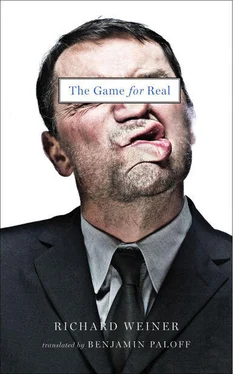But the fact that I was face-to-face with myself was not the eeriest thing; eerier still was the ardor with which my thought was trying to persuade my hesitating senses that this was no delusion; eerier still was the certainty that my senses— at just this moment my sight — had begun to live outside of my thought. What’s with them! They were looking to make a break for it, they were devising a way to explain away, that is to say refute, what was evident. But thought, like a gloomily overjoyed sheepdog, drove them back to the flock, and having discharged the time-honored office of bringer-of-reason, it persuaded them that they were deceiving themselves while believing the deceit, and it increased the panic.
I looked around for the woman, but she was deliberately turning her head away and tapping on the table. And, God knows how, that indifferent bearing of hers expressed a command so definite, so imperious and uncompromising, that my eyes again turned to the place they’d only just cowered from like worn-out, terror-hunched dogs, toward the eyes of that one whose collapsed eyelids were more bewitching and more sighted than the most fevered pupils. We were again facing each other — I and I — so closely that the waves of embarrassment got the better of my fear and led me toward an unwitting, overfamiliar gesture: I passed my hand across my face, but hardly had I done so than I was on my feet. Not my hand’s sense of touch — for it did not remember that touch would have prompted it toward that suspicion — not my hand’s sense of touch, but it was somehow another of its senses that caused alarm.
I was on my feet, a step before the tall mirror over the fireplace — I say before the tall mirror over the fireplace, knowing with sun-like clarity that I’m in front of the mirror— which, however, didn’t respond to me. And again: eerier than this betrayal of me — who, despite an unspoken but age-old pact, did not issue forth from those depths — was my ardent, gloomily high-spirited thought trying to persuade my startled senses not to be afraid, not to run away, that there was nothing to worry about, that this empty mirror was a correct mirror, that this was how it had to be .
Did I cry out? I don’t know, but how else, except as a cry, could that sudden thaw work its way out, as copious and roiling as the fear that preceded it had been miserly and desiccated? I was standing before the mirror, I knew that the mirror I was standing in front of was eerily parched, yet I sank my gaze into its extinct waters just as assuredly as a fisherman, before the appearance of the auspicious full moon, plunges his nets into the teeming waters. All I did was point a plaintive, if unfearful, left hand at the unfaithful mirror, and I said:
“He stole my face; he stole my face.”
“Which one?” she asked with a condescending indulgence that she had prepared to express with a still-smooth gesture when she was suddenly wracked as if by stifled anger, in which the lithe movement snapped. “Which one?” she repeated, having caught hold of the table’s edge, so as to overcome not yet so much her anger as the buoyancy of her rebellious pain. “Which one?” she said for the third time, in a tone whose sloppy, conversational superficiality struck an incredible contrast with its unchecked revolt.
“What, don’t you recognize Giggles?” she continued, laughing as if at a sly joke, but so excessively that I started to catch on to her intent, and in no time I had also actually discovered that this was her attempt to turn my attention away from the empty and, as it were, crumpled spot that was the only thing that testified to what had only just recently been the presence of him who had appropriated my face (and who knows if that’s all). I won’t soon forget her ever-so-splenetic aspect when she ascertained that her gambit had failed; but it was merely a fraction of a second. Like a person who, in the midst of a momentous operation that has been entrusted to him, has let it be known that he’s overheard the flippant rogue, and now regrets it, so too did she shout down her own disgruntlement, and in fact, when she stretched her arms as if to part a curtain that didn’t happen to be there, she allowed herself to depend on the slightly naïve pomp with which she announced her having come to do what she was just now performing. Having thus parted the imaginary curtain, she stepped back as though not to be in the way, and with the admirably fake gesture of criers at the town fair she called upon me to watch.
“You must pay close attention,” I hear just then in a voice that rings a bell somehow, yet is not the voice of this one here, but rather somewhat shaky, sing-song, slightly protracted; a voice that extends no further than absolutely necessary for it to have somewhere to go, with a multitude of fioritura as lightweight as washed watercolor; the kind of voice ground out from a thick shell of time; but again, a voice now refined and domesticated. And I see that it had in fact issued from the woman who had parted the curtain, but who had gone from being the Giggles “from over hill and dale” to Giggles the ur-familiar — intrepidly timid, in the wondrous démarche of her queen, Puppenfee — the trusting Giggles from the tavern up on Rue Lamarck.
“You must pay close attention,” she says after her usual fashion, that is, playfully threatening with her forefinger and hunching over slightly, “because Mutig hasn’t shown you everything.”
“Mutig. .”
“Yes, up on the hill, in the blackamoor’s chest. Mutig is magnanimous, the only one he snitched on was himself. Nothing about anyone else. Look. . do you see?” she cried, pointing with the little finger, which had gone from playfully threatening to autocratically menacing.
And I, perhaps knowing that what I was watching was again just my own apartment, and seeing nothing there besides familiar objects, was nonetheless as though plucked out, as though in spite of everything, and the blinking flaxen light of the wiry nativity scene started up, just as it had up there in the blackamoor’s chest, and just then Giggles was entering, the Giggles of the other evening , an evening already settling down nicely, it leaped fretfully into the luminous rectangle of the door, upon which Giggles was sort of caught. But having leaped for it, it realized its mistake and reeled back, for it had burnt itself on Giggles’s pain, which was so great that it emanated from her soul, creating a bright aura. Like in the monument to Marshal Ney — yes, like in the monument to Marshal Ney — of which it is said that the hand gripping the saber captures the entire action of unsheathing, so too did Giggles’s drooping hand, holding a hat, encompass the action of destruction, and thus in seeing Giggles I was also seeing how — a minute before — she was rushing to my stairs and snatching off that hat. And this, the caught-up-with past of a grotesque drama on a spiral staircase and its still more grotesque shadow, which the gaslights passed from one floor to the next as crudely as a gang passes the hussy they’ve snagged, again contain all those crumpled, dust-covered, shabby, as any-old-as-to-be-unsellable little tragediennes from the blackamoor’s chest, those unmoving, prolonged-unto-jaw-dropping-tedium tragedies, who, when they’d had enough, even treated the tragedian of this community theater like dirt for having taken them literally. Yes, Giggles plays well: it’s to a tee, as it had been the other evening, when Mutig treated her like dirt; when, not knowing up from down, she made a break for me. Yes, so too had she entered, hat in hand and in the aura of the overflowing pain upon which the fretful evening, which had settled down and mistook it for light, had flung itself. Yes, so too had she left the door ajar behind her, so too had she fallen exhausted against the wall — oh, such a good imitation! — and it was in that same spinsterishly gaunt, unsightly grief that I twice heard that “je n’en puis plus, je n’en puis plus,” so too was my heart in my throat, so too did I now. .
Читать дальше












